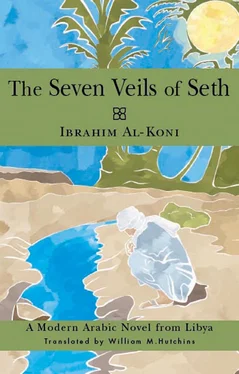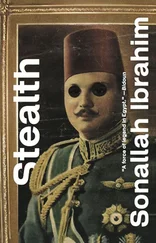“Yes, indeed. Don’t we burn the body at times with fire to root out a disease?”
The tribe’s chief, however, tilted his turban toward him and whispered, “Why not defer our discussion of deliverance until you dine with me this evening?”
“I’ve promised myself never to share a feast with another person.”
The merry gleam left the sovereign’s eyes as he asked in astonishment, “Was that an oath?”
“You could call this nonsense an oath.”
“It truly is nonsense, for the oath should be for us to share a feast instead of to lie in ambush for one another.”
“Renunciation of feasting, master, is not always a conspiracy.”
“But a covenant we inherited from our ancestors said yesterday the opposite of what you’re saying today.”
“Ha, ha. . the covenant we inherited from our ancestors proposed many maxims that, if embraced, would discourage us from devoting much time to building, developing oases, or gathering in marketplaces.”
“ ‘People are a pain, but useful.’ 3That’s what the ancient Law said.”
“ ‘No matter where the caravan goes, it will return to its point of origin.’ 4The ancient Law also said that.”
“Is that a summons to nomadism?”
“There is no imperative, master, save this.”
“But no matter what, we will pass on. We will inevitably pass away, even if we appease the entire world.”
“The nomadism of appeasement, to which you refer, master, is an ignominious form of wayfaring. It is not the maxim-driven nomadism of which the Law speaks.”
The sovereign groaned in disgust and wound the fringe of his lower veil around his index finger so that it would hide the top of his right cheek. Then he said, “It’s not a good idea to hold debates in the market. I’ve never debated with anyone about the Law’s maxims in the congested market. Accept my invitation and I’ll slaughter a she-camel to compensate for your vow.”
He laughed to disguise his discomfort, but the JennyMaster declined in no uncertain terms: “Preposterous!”
The ruler shot back defiantly, “Do you derive more human comfort in leaning on tombs than from mingling with living beings?”
The jenny’s strategist bowed his head for the first time, but the throng discerned the deeply felt sorrow that he tried to hide before answering: “By sitting with our slumbering ancestors, master, we gain the wisdom of eternal rest, because through their rest they tell us more than worldly people tell us when they pause; they tell us the truth, master.”
“We’ll learn that truth one day, whether we want to or not; what’s the hurry?”
“Because we don’t truly live, master, unless we develop a taste for slumber; because we don’t truly live today, master, unless we sleep before death arrives.”
“You astonish me. You awaken in my heart a curiosity I once assumed I had laid to rest. Is there no way to hear the noble guest save in the market square amid this din?”
He answered with a look. Then he bowed his head toward the earth before shooting off. The chief called after him, “Hermits are always right. It’s futile for us to try to win a wager with a recluse.”
PART I Section 5: The Embryos
After leaving the other members of her covey — who were meandering through a grove of palm trees — to gather firewood on the eastern plains, she started to feel dizzy. Her vision was blurred by a dark cloud, and she felt totally debilitated. She began shaking and staggering. She sat down to combat her intense abdominal pain. She closed her eyes and hyperventilated. Sweat beaded up on her forehead. Convulsed by severe trembling, she fell to her knees. She tried to vomit up the clump that blocked her esophagus but spat out only quivering saliva of a sinister hue. As she fought to free herself of this scourge, she emitted a weird groan that frightened her even more than the seizure, for it reminded her of the querulous cry a neighbor woman had released more than a year before, prior to expiring beside her. The disapproving look visible that day in the dying woman’s eyes exceeded even the disapproving ring of her groan. Was death that terrifying? Could the other woman have been that frightened by her final passage, even though she had long realized she would die? Indeed, she had repeatedly said she looked forward to death, which would end her pains.
The vertigo diminished and the dark cloud dispersed. Her breathing became more regular. She rose to return to the covey in the grove, but immediately after she passed through the palm trees that spread along the grove’s heights, a gray hare bolted between her legs and fled east, toward the sword-type dunes. Suddenly, however, he changed course and flew off to disappear behind a hill that hid him from the grove. She felt awful, haunted by a desperate sense of doom. She hastened on, mumbling the ancients’ incantations to drive off evil spirits. Hurrying, she tripped and fell. She stammered, “Bad luck, bad luck.” She kept repeating this phrase in place of the arcane charms. She tried to rise again but collapsed. At that moment, her insides contracted with pain that seemed not acute discomfort so much as a knife slashing her insides with insane malice. She screamed at the top of her lungs. She tried to rise again, but the hideous pain felled her and she tumbled to the ground. She began to writhe as the malevolent blade continued to reap the contents of her belly. She kept pressing on her abdomen with both hands as she twisted about. Her body was suffused with such profuse perspiration that she felt the thirsty sand beneath her grow damp with moisture borrowed from her body. Once the knife ceased cutting, she opened her eyes to discover that the fluid inundating her and wetting the earth beneath her was not sweat but blood flowing from between her thighs. She released such a prolonged and hurt wail that she did not hear the call of a covey member hastening to assist her: “Help, women! Tafarat’s swimming in blood!”
After sunrise on a day promising severe heat, a proclamation rang out in the oasis: “Today, oasis dwellers, an affliction has settled on our homes; a malady has affected women’s bellies. So perform sacrificial offerings and try to stay calm until the matter is clarified and the affliction’s cause is discovered. Those present are duty-bound to inform those absent.”
The fool moved from one neighborhood to another, speedily at times and slowly at others, wiping sweat from his face with the tip of his veil at times and with the sleeve of his garment at others, and raising his voice to call out at times and falling silent to catch his breath at others. He paused repeatedly in front of houses and huts to receive water from women, who watched him inquisitively as he sipped from their jugs or wooden vessels before darting away again. Only the fool realized, however, that what passersby observed in women’s eyes that day was not curiosity, thirst for information, or fear of the unknown — which are normally associated with the news of any scourge — but a feeling greater than all of these. Their eyes had an expression of certainty presaging calamity; for the scourge this time not only threatened the women but constituted a conspiracy that threatened to deprive the oasis of offspring — perhaps even the whole desert. The women’s calamity, however, did not silence him, for he continued to shout the announcement: “Today, oasis dwellers, an affliction has settled on our homes; a malady has afflicted women’s bellies. So perform sacrificial offerings and try to stay calm until the matter is clarified and the affliction’s cause is discovered. Those present are duty-bound to inform those absent.”
Читать дальше












